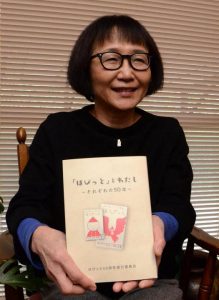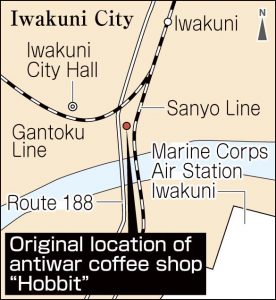Book about “Hobbit” coffee shop in Iwakuni, published with help of 28 volunteers, communicates to modern era antiwar sentiment of young people protesting Vietnam War
Dec. 23, 2021
by Keiichi Nagayama, Staff Writer
In the 1970s, when the Vietnam War had become a quagmire, the coffee shop “Hobbit,” located in the area of Imazu-machi in Iwakuni City, adjacent to the Marine Corps Air Station Iwakuni, gathered together young antiwar activists for a short period of four years. Prior to the recent 50th anniversary of the beginnings of the shop, 28 volunteers who had been involved in the shop, financed the publication of a book about their memories of that era. Joko Iwase, 71, one of the authors and an author of children’s stories who lives in Iwakuni, said, “That was a coffee shop where young people contemplated the meaning of true peace and that affected so many people through a process of trial and error. I want people to know that such a place once existed.”
The publication, 131 pages in length, is titled ‘Hobbit’ to Watashi―Sorezore no 50-nen (in English, ‘Hobbit’ and I―Each of our 50 years). Hobbit opened its doors in February 1972 based on the independent efforts of students from Kyoto and Fukuoka who had expressed their support for American soldiers opposed to the war. The shop, which had a log-house configuration, featured music by Bob Dylan and the Doors, with the comic book Garo and other publications lined up on shelves. Featured in fashion magazines, the coffee shop used to serve as a hangout for young people from Yamaguchi Prefecture and elsewhere, until it closed in January 1976.
At those times, television would show nearly daily images of the U.S. military bombing Vietnam. Young people would fly kites near the Iwakuni base in an attempt to prevent U.S. aircraft from taking off and publish newsletters in cooperation with American soldiers on the base who opposed the war. The recently published book includes the thoughts of shop employees and regulars, many of whom are now in their 70s, about their youth, their lives after that time, their circumstances today, and about the Marine Corps Air Station Iwakuni, a base designed to strengthen U.S. military power.
Ms. Iwase, who is from the area of Kuga in Iwakuni City, started her career as a writer of children’s stories following her encounter with a writer who had given a talk at the coffee shop. Looking back on those days, she said, “Young people who came to the shop spoke freely about social issues with each other, met various people, and took action about the issues of the day.”
The start of Hobbit and how its business worsened due to pressure from the police and the U.S. military are also described in detail in the book Hobbit: Senso wo Tometa Kissaten (in English, Hobbit: The Coffee Shop that Stopped the War), written by the late Roppei Nakagawa, first manager of the shop.
Masakazu Washino, 71, a resident of Fukutsu City in Fukuoka Prefecture and a former coffee shop employee who lobbied for publication of the book, said, “The people who were involved in Hobbit went on with their lives, but their desire for a world without war has not changed. I want young people to know what it was like back then and our ideas that persist today.” The book is priced at 2,000 yen. For more information contact Mr. Washino, at 090-1081-0437.
(Originally published on December 23, 2021)
In the 1970s, when the Vietnam War had become a quagmire, the coffee shop “Hobbit,” located in the area of Imazu-machi in Iwakuni City, adjacent to the Marine Corps Air Station Iwakuni, gathered together young antiwar activists for a short period of four years. Prior to the recent 50th anniversary of the beginnings of the shop, 28 volunteers who had been involved in the shop, financed the publication of a book about their memories of that era. Joko Iwase, 71, one of the authors and an author of children’s stories who lives in Iwakuni, said, “That was a coffee shop where young people contemplated the meaning of true peace and that affected so many people through a process of trial and error. I want people to know that such a place once existed.”
The publication, 131 pages in length, is titled ‘Hobbit’ to Watashi―Sorezore no 50-nen (in English, ‘Hobbit’ and I―Each of our 50 years). Hobbit opened its doors in February 1972 based on the independent efforts of students from Kyoto and Fukuoka who had expressed their support for American soldiers opposed to the war. The shop, which had a log-house configuration, featured music by Bob Dylan and the Doors, with the comic book Garo and other publications lined up on shelves. Featured in fashion magazines, the coffee shop used to serve as a hangout for young people from Yamaguchi Prefecture and elsewhere, until it closed in January 1976.
At those times, television would show nearly daily images of the U.S. military bombing Vietnam. Young people would fly kites near the Iwakuni base in an attempt to prevent U.S. aircraft from taking off and publish newsletters in cooperation with American soldiers on the base who opposed the war. The recently published book includes the thoughts of shop employees and regulars, many of whom are now in their 70s, about their youth, their lives after that time, their circumstances today, and about the Marine Corps Air Station Iwakuni, a base designed to strengthen U.S. military power.
Ms. Iwase, who is from the area of Kuga in Iwakuni City, started her career as a writer of children’s stories following her encounter with a writer who had given a talk at the coffee shop. Looking back on those days, she said, “Young people who came to the shop spoke freely about social issues with each other, met various people, and took action about the issues of the day.”
The start of Hobbit and how its business worsened due to pressure from the police and the U.S. military are also described in detail in the book Hobbit: Senso wo Tometa Kissaten (in English, Hobbit: The Coffee Shop that Stopped the War), written by the late Roppei Nakagawa, first manager of the shop.
Masakazu Washino, 71, a resident of Fukutsu City in Fukuoka Prefecture and a former coffee shop employee who lobbied for publication of the book, said, “The people who were involved in Hobbit went on with their lives, but their desire for a world without war has not changed. I want young people to know what it was like back then and our ideas that persist today.” The book is priced at 2,000 yen. For more information contact Mr. Washino, at 090-1081-0437.
(Originally published on December 23, 2021)









